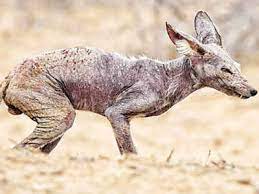Desert Fox And Mange Disease:

A few Desert Foxes were spotted in the scrub forests of Rajasthan’s Jaisalmer district, suffering from a loss of fur due to the Mange Skin Disease.
- There were 8,331 foxes — both Indian and desert foxes — in the state according to the 2019 wildlife census of Rajasthan.
Desert Fox:
- Common Name: White-footed fox
- Scientific Name: Vulpes vulpes pusilla
- Desert fox is the third sub-species of red fox in India.
- Other two subspecies are: the Tibetan Red Fox and the Kashmir Red Fox.
- They can be differentiated from other fox species by their white tail-tip. Beady eyes and a small snout give them an endearing, almost adorable look.
- Its range does not overlap with that of other red fox sub-species.
- Desert fox inhabits the dry and semi-arid regions of western and north-western India.
- Desert foxes occupy less than half of their potential habitats in India.
- Desert foxes can be found wandering around sand dunes and semi-dried river beds, where they build their dens.
- They are omnivores consuming almost everything from berries and plants to desert rodents, insects, spiders, small birds, and lizards, like the spiny tail.
- They are threatened by habitat loss, road-related mortality and negative interactions with free-ranging/domestic dogs.
- Protection Status:
- IUCN Red List: Least Concern
- CITES listing: Appendix II
- India’s Wildlife (Protection) Act: Schedule II
Mange:
- Mange is a skin disease of animals caused by mite infestations, characterized by inflammation, itching, thickening of the skin, and hair loss.
- The most severe form of mange is caused by varieties of the mite Sarcoptes scabiei, which also causes human scabies.
- Some form of mange is known in all domestic animals, although many varieties of mange mites infest only one species.
- They are transmitted between animals by direct contact and by objects that have been in contact with infested animals.




